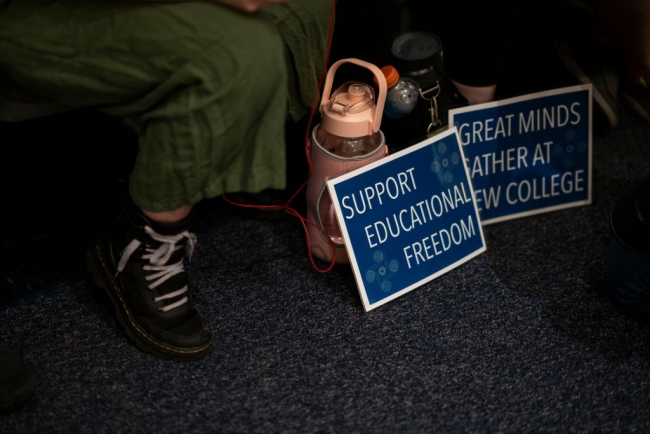You have /5 articles left.
Sign up for a free account or log in.

Multiple NCF students and employees urged trustees to grant tenure to five applicants at Wednesday’s board meeting.
The Washington Post/Getty Images
During a contentious Board of Trustees meeting Wednesday, five professors at the New College of Florida were denied tenure—even though they had already received approvals at every other point in the process.
Those professors are the latest casualties of the culture-war politics that led conservative trustees appointed by Florida governor Ron DeSantis to spearhead a self-declared “hostile takeover” of the college.
The tenure denial prompted the abrupt resignation of Matthew Lepinski, the faculty trustee on the board, who accused fellow members of destabilizing NCF. Lepinski walked out after the vote, announcing suddenly that he was “quitting the college.”
The tenure denial comes amid DeSantis’s quest to convert the small honors college into the “Hillsdale of the South,” modeled on the prominent Christian college in Michigan with deep ties to the Republican Party. In January, the governor appointed six new trustees, who began their work of reshaping NCF by ousting then-president Patricia Okker and replacing her with Richard Corcoran, a former Republican politician, who got a $400,000 pay bump over his predecessor.
New College trustees voted in February to eliminate the diversity, equity and inclusion office, a move Republicans are trying to emulate across the state through legislation that would defund such programs, which DeSantis has called discriminatory against white people, a drain on university resources and generally divisive. His charge against DEI comes amid widespread speculation that he will soon launch a 2024 campaign for the White House.
The Board Vote
Prior to Wednesday’s meeting, Corcoran asked the board to deny or defer the tenure appointments due to “extraordinary circumstances” and “a renewed focus on ensuring the college is moving towards a more traditional liberal arts institution,” according to a memo published in board meeting documents. Corcoran also noted the “current uncertainty of the needs of the divisions/units and college.” (All five faculty members had been approved for tenure by Bradley Thiessen, who briefly served as acting president between Okker and Corcoran. Thiessen is now interim provost.)
The five professors who were denied tenure by NCF’s Board of Trustees on Wednesday are Rebecca Black, Lin Jiang, Nassima Neggaz, Gerardo Toro-Farmer and Hugo Viera-Vargas. They can resubmit tenure bids in the future if they want; all five were applying in their fifth year at NCF, rather than the customary sixth year.
In a split vote, the Board of Trustees decided against tenure for them during the meeting, which featured more than 50 speakers in the public comment portion. Many argued in defense of the five applicants; others chided Corcoran and the board for pushing a political agenda that they argued limits academic freedom on campus and diminishes what makes New College special.
Some commenters made impassioned pleas in support of the five professors, noting the role tenure plays in academic freedom. Others spoke angrily, with several referring to Nazi Germany and Adolf Hitler’s attacks on academic freedom. And some bemoaned the agony of being caught in the culture war that has ensnarled NCF; one student declared, “I’m tired of this” and “I have an essay due at midnight,” while another blasted college leaders, bluntly yelling, “Fuck you, Richard Corcoran.”
In remarks to the board, Corcoran noted that seven faculty members had originally been up for tenure but two withdrew their applications as he requested. The interim president focused his argument largely on the “extraordinary circumstances” facing New College, including its slate of new leaders. Others who voted to deny tenure, including trustee Mark Bauerlein—who was a tenured professor at Emory University—took issue with the candidates coming up for tenure in their fifth rather than sixth year, and claimed some applicants had questionable publication history, though Bauerlein didn’t specify whom he was talking about.
Grace Keenan, the sole student trustee at NCF, responded that one-third of tenure applicants come up for approval in their fifth year at the college, according to data from the provost’s office. Keenan was one of four trustees to vote for their approval, along with Lepinski, Sarah Mackie and Mary Ruiz.
But at the end of the day, the board majority ignored their arguments and voted against granting tenure to the five applicants, despite questions from several members about the fairness of the process. The vote prompted chants of “shame on you” from attendees as the meeting wound down and Lepinski announced his resignation.
“I am very concerned about the direction that this board is going and the destabilization of the academic program, and I wish you the best of luck, but this is my last board meeting. I’m leaving the college,” Lepinski said before standing and walking away.
The Backlash
In a Wednesday press conference following the vote, Steve Shipman, a chemistry professor and president of the New College chapter of the United Faculty of Florida, called the decision to deny tenure “tragic” and expressed concern that such a move would spur faculty departures. Though the five applicants can reapply for tenure next year, Shipman said, “They’ve just been shown that the school doesn’t value them. I don’t know why they would stick around.”
The move has also drawn condemnation from outside Florida. After the vote, the American Association of University Professors raised concerns about interference in the tenure process and academic freedom.
“After watching the New College of Florida Board of Trustees meeting, it is clear to me that academic freedom, shared governance and respect for mutually-approved processes and procedures, and contractual requirements have been thrown under the bus by the new trustees,” AAUP president Irene Mulvey said in a Wednesday news release. “These weren’t decisions on tenure or qualifications. The slimmest majority of the board changed the rules in the middle of the game. New College is being held hostage and fighting for its life.”
In a statement before the vote, the AAUP noted its “growing concern” with “political interference into the affairs of Florida’s colleges and universities that has threatened academic freedom and shared governance in those institutions and undermined the very role of higher education as essential to a functioning democracy.” An AAUP special committee is reviewing “the pattern of politically and racially motivated attacks on higher education in Florida,” it said, and will release its findings this summer.
The free expression group PEN America also weighed in with a statement Wednesday.
“This tragic decision by the out-of-state political operatives who have hijacked the New College Board of Trustees will have negative and undeserved professional consequences for five faculty members who successfully completed the normal tenure process at New College. These are real people with families whose employment status and academic freedom protections have been thrown into limbo," said Jeremy C. Young, manager of free expression and education programs at PEN America.
Young added, “With each new censorious action, the Board of Trustees demonstrates that its vision of New College as a ‘Hillsdale of the South’ does not include intellectual freedom or quality academic instruction.”
The denial decision at NCF comes at a time when opportunities to obtain tenure are shrinking; an AAUP study last year found that 27 percent of professors are tenured and about 10 percent are in tenure-track jobs, with the remaining posts filled by full- and part-time contingent faculty, according to federal data from 2019.
Other studies have indicated that the percentage of faculty members of color who receive tenure are even lower. That’s relevant at NCF, where four of the denied applicants are minorities.








